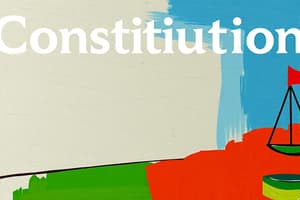Podcast
Questions and Answers
¿En qué se fundamenta la Constitución Española?
¿En qué se fundamenta la Constitución Española?
- En la organización territorial del Estado.
- En la indisoluble unidad de la Nación Española.
- En la independencia de los poderes del Estado.
- En un Estado social y democrático de Derecho. (correct)
Según el artículo 3 de la CE, el castellano es la lengua oficial del Estado y todos los españoles:
Según el artículo 3 de la CE, el castellano es la lengua oficial del Estado y todos los españoles:
- Tienen el deber de conocer y el derecho de usar el castellano.
- Tienen el derecho de conocer y usar el castellano. (correct)
- Tienen el derecho y el deber de conocer el castellano.
- Tienen el deber de usar y el derecho de conocer el castellano.
La Constitución Española reconoce y garantiza el derecho a la autonomía:
La Constitución Española reconoce y garantiza el derecho a la autonomía:
- De las nacionalidades y regiones que la integran.
- De las nacionalidades que la integran.
- De las Comunidades Autónomas que la integran. (correct)
- De las regiones que la integran.
El Preámbulo de la Constitución:
El Preámbulo de la Constitución:
Señala la respuesta correcta, respecto de la aprobación, ratificación y publicación de la Constitución Española:
Señala la respuesta correcta, respecto de la aprobación, ratificación y publicación de la Constitución Española:
¿Qué parte de la Carta Magna se establece la exposición de motivos que impulsan la norma constitucional y los objetivos que con ella se pretenden alcanzar?
¿Qué parte de la Carta Magna se establece la exposición de motivos que impulsan la norma constitucional y los objetivos que con ella se pretenden alcanzar?
La Constitución Española fue sancionada por:
La Constitución Española fue sancionada por:
¿Cuáles de los siguientes españoles de origen pueden ser privados de su nacionalidad?
¿Cuáles de los siguientes españoles de origen pueden ser privados de su nacionalidad?
Según la CE son fundamentos del orden político y la paz social:
Según la CE son fundamentos del orden político y la paz social:
Flashcards
Fundamento de la Constitución Española
Fundamento de la Constitución Española
La Constitución Española de 1978 se basa en la idea de un Estado social y democrático de Derecho, donde los derechos y libertades de los ciudadanos son protegidos por la ley.
Lengua oficial de España
Lengua oficial de España
El castellano es la lengua oficial de España, y todos los españoles tienen el derecho a conocerlo y utilizarlo.
Autonomía en la Constitución Española
Autonomía en la Constitución Española
La Constitución Española reconoce el derecho a la autonomía de las Comunidades Autónomas, que son regiones con gobiernos propios dentro de España.
Preámbulo de la Constitución
Preámbulo de la Constitución
Signup and view all the flashcards
Aprobación, ratificación y publicación de la Constitución Española
Aprobación, ratificación y publicación de la Constitución Española
Signup and view all the flashcards
Propósito del Preámbulo de la Constitución
Propósito del Preámbulo de la Constitución
Signup and view all the flashcards
Quién sancionó la Constitución Española
Quién sancionó la Constitución Española
Signup and view all the flashcards
Pérdida de la nacionalidad española
Pérdida de la nacionalidad española
Signup and view all the flashcards
Fundamentos del orden político y la paz social
Fundamentos del orden político y la paz social
Signup and view all the flashcards
Study Notes
Constitución Española de 1978 - Principios Generales
- Fundamento de la Constitución: Based on a democratic state of law, the indivisible unity of Spain, the independence of state powers, and the territorial organization of the state.
- Lengua Oficial: Spanish (castellano) is the official language of the state, and all Spanish citizens have the right and duty to know and use it.
- Autonomía Regional: The Constitution recognizes and guarantees the right to autonomy of the nationalities and regions that make up Spain, including autonomous communities.
- Preámbulo (Preamble): Serves as a declaration of intent, guiding interpretation, not legally binding.
- Aprobación, Ratificación y Publicación de la Constitución: Approved by the Cortes on October 31, 1978, ratified by popular referendum on December 16, 1978, and officially published on December 29, 1978.
- Motivos de la Constitución: The reasons and goals behind the constitution are explained in the preliminary title.
Derechos Fundamentales
- Derechos a la Autonomía: The constitution guarantees the right to self-governance for the Spanish nationalities and regions.
- Español y Castellano: Castellano (Spanish) is the official language though all Spanish citizens have the right and responsibility to know and use it.
- Privación de la Nacionalidad (Loss of Nationality): Spanish citizens can lose their nationality under certain conditions, such as membership in terrorist groups or attempts against the King or other members of the Royal Family or the government.
- Orden Político (Political Order): The dignity of the individual, inherent inviolable rights, and respect for the law are fundamental to political order and social peace.
Studying That Suits You
Use AI to generate personalized quizzes and flashcards to suit your learning preferences.



